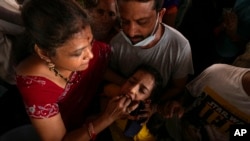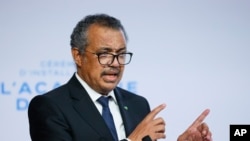The World Health Organization says traditional medicine plays a pivotal role in the health and well-being of people and the planet and should be seen as complementary to modern medicine and be integrated into national health systems.
Traditional healers have used their knowledge of plants and potions for centuries to treat people with multiple ailments. Much traditional indigenous and ancestral knowledge of traditional medicine is frequently used in health care across the world.
"We are seeing a lot of increasing demand and increasing interest in traditional medicine at the moment," said Rudi Eggers, WHO director for integrated health services. "Traditional medicine has become a global phenomenon."
He said 170 out of 194 countries have reported to WHO "that they used traditional medicine in some form, such as acupuncture, herbal medicine, yoga, and indigenous medicine in their countries. In fact, for millions of people, of course, it is the first choice for health care. In some cases, the only choice for health care."
The WHO says that around 40 percent of modern pharmaceutical products have roots in traditional medicine.
"Many traditional medicines were the basis for some of the classic scientific and medical technologies that have led to some of the major medical breakthroughs, including drugs like aspirin or artemisinin for malaria, and even smallpox inoculation," said Shyama Kuruvilla, the WHO lead for the Global Center for Traditional Medicine.
Next week, WHO is convening the Traditional Medicine Global Summit in Gandhinagar, Gujarat, India. The two-day high-level meeting will explore the role of "traditional, complementary, and integrative medicine in addressing pressing global health challenges."
WHO Director-General Tedros Adhanom Ghebreyesus noted the "important and catalytic role" traditional medicine can play in achieving the goal of universal health coverage and in meeting global health-related targets that were disrupted by the COVID-19 pandemic.
He said, "Bringing traditional medicine into the mainstream of health care…can help bridge access gaps for millions of people around the world" and would be an important step toward people-centered and holistic approaches to health and well-being.
Kuruvilla agreed that holistic well-being is at the core of all traditional medicine systems, adding that there are existing legal measures and commitments aimed at achieving this goal.
"For example, at the United Nations, the heads of states and governments in 2019 committed to looking at evidence-based ways to integrate traditional medicine into national health systems," she said. "There are many existing commitments and frameworks that now needed to be implemented."
Evidence essential, say experts
WHO officials say traditional medicine has contributed to breakthrough discoveries and continues to hold out great promise of other game-changing achievements.
They caution, however, that recommendations on any new therapy or treatment must be based on solid scientific evidence.
"Advancing science on traditional medicine should be held to the same rigorous standards as in other fields of health," said John Reeder, WHO director of both the department of research for health and the special program for research and training in tropical diseases.
"We need to treat traditional interventions with the same respect we give to other more Western medical interventions and that means examining them closely and critically and scientifically in the same way," he said.
Summit will highlight best practices
WHO reports next week's summit will explore research and evaluation of traditional medicine. It also will be an opportunity to showcase countries' experiences, explore regional trends and discuss best practices.
While traditional medicine has proven its value over many centuries, WHO officials say it cannot replace modern medical care.
Kim Sungchol, head of WHO's traditional, complementary, and integrative medicine unit, observed that traditional and modern medicines have two different but complementary approaches to health.
"There is a certain advantage of each system," he said. "For example, modern medicine is quite good and good in emergency care, in communicable disease management, and antibiotics.
"On traditional medicine, one of the unique characteristics that it has is the more holistic approach. It is much advanced in the promotion and prevention, particularly linked to non-communicable diseases," he said. "So, we have to see the two things differently. We have to identify the strengths of each system to work together to best serve the well-being of the people and planet. That is our purpose."





